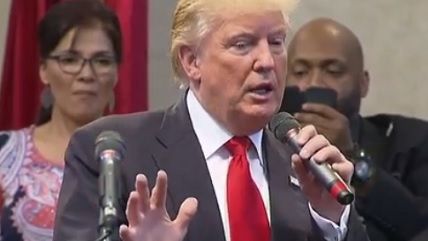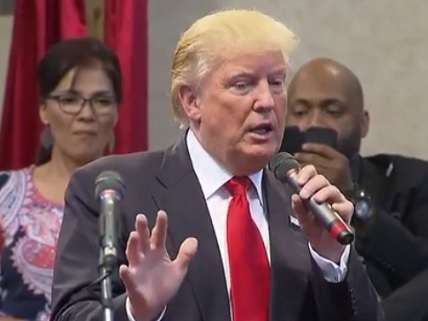Trump Responds to Terrence Crutcher Shooting: Maybe the Cop Shouldn't be a Cop
Simple sentiment not articulated by many other mainstream politicians.


At a rally in Ohio this morning, Donald Trump addressed the police shooting of Terrence Crutcher, whose car had broken down on the road and who had his hands up when he was shot, in Tulsa on Friday. Trump said it looked like Crutcher had done "everything he was supposed to do." Some police apologists had pointed to Crutcher moving away from police with his hands up, and thus not following orders, as a justification for his shooting. The video was posted on Twitter by NBC Nightly News.
Trump also suggested the officer who fatally shot Crutcher had "choked" (he had previously described the police officers who shot and killed Alton Sterling and Philando Castile in the same way) and should not be employed as a police officer. "Was she choking? What happened?" Trump asked in his usual extemporaneous manner. "But maybe people like that, people that choke, people that do that maybe they can't be doing what they're doing, okay? They can't be doing what they're doing."
This simple-seeming sentiment is actually quite radical. The Obama Department of Justice, which has ran investigations of police departments accused of systemic civil rights violations around the country, is careful to praise even the police officers in the departments on which they impose reform mandates. While Hillary Clinton has adopted some of the language and players of the Black Lives Matter movement (like the mothers of victims of police brutality), to my knowledge she has never expressed the opinion that any particular individual officer perhaps does not belong in that line of work.
That should not be surprising. While the nation's largest police union endorsed Trump last week (Clinton did not respond to their questionnaire at all) and Republicans have generally been supporter of police unions (Scott Walker's public union reforms in Wisconsin, for example, exempted police and firefighter unions; John Kasich's reforms in Ohio did not, but were defeated), Democrats have long been champions of public unions and of embedding privileges and protections for public workers' employment in state and federal law.
While Black Lives Matter's Campaign Zero has identified unfair police union contracts as one of ten areas of reform that would lower police violence, no major Democrat has as yet endorsed that idea. Democrats have not, it seems, yet found a way to compellingly divorce police unions from other public unions, which they support and which support them. This isn't surprising either, because a compelling differentiation doesn't exist. Just as bad cops threaten the lives of the people they are employed to serve and protect, bad teachers, for example, threaten the educations, and therefore long-term income earning potentials, of the people they are employed to educate. A recent lawsuit in California by a number of students, for example, made exactly that case.
As I argued in 2013, perhaps it is time to consider zero tolerance for bad cops. (Bill O'Reilly made a similar argument in 2015 after police violence became a national issue.) While applying pressure on police departments after fatal shootings like that of Terrence Crutcher, or Keith Lamont Scott in North Carolina, to submit to impartial investigations and to hold the officers involved to some kind of accountability is important, so are reforms that would prevent such killings in the first place. Dismantling the privileges police officers have via their union contracts, state "law enforcement officers' bill of rights" laws, and other public employee protection laws, would remove many of the barriers in firing police officers. Currently, it is often close to impossible to fire police officers involved in shootings if they have not been criminally convicted. Yet the standard to fire a government employee should not be as high as the standard to deprive someone of their freedom and put them in jail.
Democrats, and police apologists on the right, have pushed the idea that government workers have the right to "due process," but that notion goes against the theoretical nature of government workers as public servants. If they are public servants, they ought to work at the pleasure of the public, rather than having their jobs protected by additional layers of privileges granted by the government for which they nominally work. Such a set up as currently exists turns government workers into a privileged class, something that is not compatible with democratic institutions. Democrats should listen to Donald Trump's sentiment and embrace it.
Trump's sentiment, incidentally, was shared by a police chief in Ohio, who wrote on his Facebook page that he was so "tired and mentally drained from seeing things" like the Crutcher shooting. Cops who "can't do the job or are scared of people different than you," wrote the chief, should "get out of the job. You are making us all look bad. STOP." It's up to lawmakers to remove the protections keeping such cops on the job.
Related: Donald Trump could consider suggesting a database for police offenders to keep police officers who don't belong on the job out of police work.
